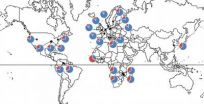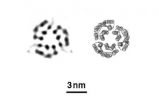(Press-News.org) Our response to societal pressures about vaccination has a direct effect on the spread of pediatric infectious diseases in areas where inoculation is not mandatory, says new research published this week in Proceedings of the Royal Society B.
By incorporating social norms into predictive mathematical modelling, a research team from the University of Guelph and the University of Waterloo found that they can foresee the observed patterns of population behaviour and disease spread during vaccine scares—times when anti-vaccine sentiment is strong.
"If vaccination is not mandatory and disease is rare, then a few parents will be tempted to stop vaccinating their children," said Professor Chris Bauch of Waterloo's Faculty of Mathematics, and one of the study authors. "More parents adopt this behaviour as social norms begin to change and it becomes increasingly acceptable to avoid some vaccines. Obviously, when enough parents are no longer vaccinating, the disease will come back."
In most of North America, pediatric vaccination is mandatory for children enrolled in public education. However, the number of parents applying for exemptions to pediatric vaccination is on the rise. According to Professor Bauch, as that trend continues Canadians will increasingly find themselves in a situation where vaccination coverage has declined and populations are once again susceptible to disease.
"Parents are not cold, clinical rationalists who base their decisions only on data. They are strongly influenced by other parents and what they read," said Professor Bauch. "Our research suggests that health officials needs to have a really good understanding of the social context to better understand vaccine scares and why people refuse vaccines. To do that, we have to develop predictive tools that also reflect social behavior patterns, or we won't be able to accurately represent what is happening during vaccine scares."
Predictive modelling can help public health officials plan for responses to vaccine programs. The models that Professor Bauch and his colleagues use can determine what may happen in a population where a vaccine scare has taken hold.
"If you've seen a big drop in vaccine coverage and you've seen a surge of disease because of that, you can use these models to predict how long it will take vaccine coverage to recover," said Professor Bauch.
Professor Bauch and his colleagues will continue to study how social norms interact with disease spread. Down the road, he hopes to use this model to create an index, which may be able to help determine which populations are more susceptible to vaccine scares, with the hope of preventing them from occurring.
INFORMATION: END
Social norms strongly influence vaccination decisions and the spread of disease
2014-02-14
ELSE PRESS RELEASES FROM THIS DATE:
New insight into protein misfolding in neurodegenerative disorders
2014-02-14
Research by the University of Southampton has provided new insight into the consequence of accumulated 'misfolded proteins' in neurodegenerative disorders, such as Prion and Alzheimer's disease.
Prion and Alzheimer's disease are protein misfolding brain diseases, where genetic mutations, or more commonly, interactions between an individual's genetics and environmental influences cause functional proteins in neurons to become misfolded or misrouted. In these diseases, there is a progressive death of nerve cells in specific brain regions, which is associated with the increasing ...
Geographical passwords worth their salt
2014-02-14
It's much easier to remember a place you have visited than a long, complicated password, which is why computer scientist Ziyad Al-Salloum of ZSS-Research in Ras Al Khaimah, UAE, is developing a system he calls geographical passwords.
Writing in a freely available "open access" research paper in the International Journal of Security and Networks, Al-Salloum emphasizes how increasingly complicated our online lives are becoming with more and more accounts requiring more and more passwords. Moreover, he adds that even strong, but conventional passwords are a security risk ...
Antimicrobial preservation strategies to prevent food contamination
2014-02-14
New Rochelle, NY, February 13, 2014—Food spoiling and poisoning caused by microbial contamination can cause major health, social, and economic problems. The broad scope of antimicrobial approaches to kill or prevent the growth of microorganisms in foods and beverages, including a variety of natural and artificial preservative strategies, are described in a comprehensive Review article in Industrial Biotechnology, a peer-reviewed journal from Mary Ann Liebert, Inc., publishers. The article is available on the Industrial Biotechnology website.
In the Review "Ingredient ...
New depression treatments reported
2014-02-14
MAYWOOD, IL – New insights into the physiological causes of depression are leading to treatments beyond common antidepressants such as Prozac and Zoloft, researchers are reporting in the in the journal Current Psychiatry.
Depression treatments on the horizon include new medications, electrical and magnetic stimulation of the brain and long-term cognitive behavioral therapy for stress management.
Authors are Murali Rao, MD, and Julie M. Alderson, DO. Rao is professor and chair of the Department of Psychiatry and Behavioral Neurosciences at Loyola University Chicago ...
Geographic variation of human gut microbes tied to obesity
2014-02-14
People living in cold, northern latitudes have bacteria in their guts that may predispose them to obesity, according to a new study by researchers at the University of California, Berkeley, and the University of Arizona, Tucson.
The researchers' analysis of the gut microbes of more than a thousand people from around the world showed that those living in northern latitudes had more gut bacteria that have been linked to obesity than did people living farther south.
The meta-analysis of six earlier studies by UC Berkeley graduate student Taichi Suzuki and evolutionary ...
What do women want? It depends on the time of the month
2014-02-14
If she loves you and then she loves you not, don't blame the petals of that daisy. Blame evolution.
UCLA researchers analyzed dozens of published and unpublished studies on how women's preferences for mates change throughout the menstrual cycle. Their findings suggest that ovulating women have evolved to prefer mates who display sexy traits – such as a masculine body type and facial features, dominant behavior and certain scents – but not traits typically desired in long-term mates.
So, desires for those masculine characteristics, which are thought to have been ...
Another reason to not mix work and family: Money makes parenting less meaningful
2014-02-14
Austin – February 14, 2014 - Money and parenting don't mix. That's according to new research that suggests that merely thinking about money diminishes the meaning people derive from parenting. The study is one among a growing number that identifies when, why, and how parenthood is associated with happiness or misery.
"The relationship between parenthood and well-being is not one and the same for all parents," says Kostadin Kushlev of the University of British Columbia. While this may seems like an obvious claim, social scientists until now have yet to identify the psychological ...
In-hospital formula use deters breastfeeding
2014-02-14
(SACRAMENTO, Calif.) — When mothers feed their newborns formula in the hospital, they are less likely to fully breastfeed their babies in the second month of life and more likely to quit breastfeeding early, even if they had hoped to breastfeed longer, UC Davis researchers have found.
"We are a step closer to showing that giving formula in the hospital can cause problems by reducing how much women breastfeed later," says Caroline Chantry, lead author and professor of clinical pediatrics at UC Davis Medical Center. "Despite being highly motivated to breastfeed their babies, ...
Superbright and fast X-rays image single layer of proteins
2014-02-14
RICHLAND, Wash. -- In biology, a protein's shape is key to understanding how it causes disease or toxicity. Researchers who use X-rays to takes snapshots of proteins need a billion copies of the same protein stacked and packed into a neat crystal. Now, scientists using exceptionally bright and fast X-rays can take a picture that rivals conventional methods with a sheet of proteins just one protein molecule thick.
Using a type of laser known as XFEL, the technique opens the door to learning the structural details of almost 25 percent of known proteins, many of which have ...
Head, neck injuries may increase stroke risk among trauma patients younger than 50
2014-02-14
Suffering an injury to the head or neck increases ischemic stroke risk three-fold among trauma patients younger than 50, according to research presented at the American Stroke Association's International Stroke Conference 2014.
"These findings are important because strokes after trauma might be preventable," said Christine Fox, M.D., M.A.S., lead author and assistant professor of neurology at the University of California San Francisco.
Researchers studied the health records of 1.3 million patients younger than 50 years who had been treated in emergency trauma rooms. ...



